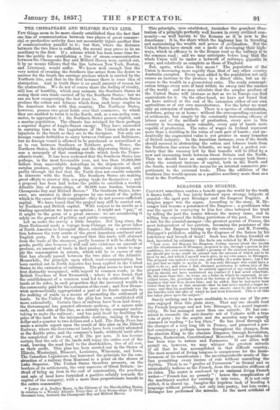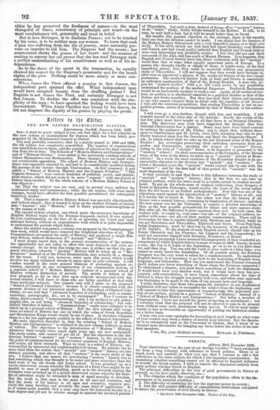BERA.NGER AND EUGENIE.
CA.LITMNY sometimes confers a benefit upon the world by the truth it draws forth. It has lately fastened upon strange subjects of scandal—the aged poet Beranger and the Empress Eugenie. A Belgian paper was the organ. According to the story, M. Beranger had becomea pensioner of the Empress ; a gentleman who was the agent in conveying to him her alms betrayed his trust by telling the poet the source whence the money came, and in telling him exposed the failing patriotism of the poet. Mere was a tale for the scandal-monger--the greatest genius of France, the most independent of her patriots, becoming the pensioner of the Empire ; the Empress buying up the veteran ; and M. Perrotin, Beranger's publisher, adding to the disgrace of the liaison by his indelicacy and breach of trust ! Such was the fiction founded on fact, invented by calumny,: the facts are related by M. Perrotin " Last year, her Majesty the Empress, feeling uneasy about the health and the circumstances of Wranger, proposed to me, through a person in her confidence her own secretary, under a promise of the strictest secrecy, that she should pay to my credit an annual sum the amount of which was to be fixed by me, and "which I myself was to give, in my own name, to Bdranger. The proposal was indeed a royal one, and worthy of a noble heart; but I for my part had no right to accept it. It was onlypranger who could have a right to do so ; and when I had obtained permission to inform him of the proposal which had been velar, he entirely approved of my conduct, saying that he should not have understood my conduct if I had acted otherwise. He did more than this : he wrote me a letter in which he expressed, in excellent terms, the gratitude which at the bottom of his heart he felt for the kindness that had been shown him ; and he added, that he had never been richer than he was at that moment—that he had never needed a larger income; and that his gratitude was the more sincere since he did not accopt the benefits with the offer of which he had been honoured. This is all that has taken place upon the subject." Surely nothing can be more creditable to every one of the persons engaged than this plain story. That any one should read the French language and not love &ranger, is a moral impossibility,. He has managed more than one miracle. He has contrived to reconcile the anti-fanatic wit of Voltaire with a true vein of piety ; for the sceptic and the moralist may be equally charmed in reading "Le bon Dieu." He has lived through all the changes of a very long life in France, and preserved a perfect consistency; perhaps because throughout the changes, from the absolute King to the absolute Emperor, through Revolution, Empire Restoration, Constitutional Monarchy, and Republic, he has been true to nature and Parnassus. If our allies will permit us however, we may whisper the greatest miracle of all that he has accomplished in that difficult country. The most musical of living tongues is conspicuous for the licentiousness of its versification; the inextinguishable music of Italian permitting every licence of rule without uncurling the rhythm. There is no gradus ad Parnassum" so formal and so unspeakably tedious as the French, from the excessive stiffness of its rules. The secret is confessed by an eminent living French writer—" French has no prosedy " : hence the complication of the machinery needed for twisting it into verse. It is not only stilted, it is shored up. Imagine the hopeless task of bending a language without prosody, not only into poetry, but into verse; &ranger has perrined the miracle. In the most artificial of cities he has preserved the freshness of nature—in the most changeful of times, consistency of principle and heart—m the most revolutionary wit, generosity and trust in belief. Not to love Beranger, is to disclaim France ; not to be touched by his verse, is to be neither man nor woman. To learn that such a man was suffering from the ills of penury, must naturally provoke an impulse to aid him. The Empress had the means ; her countenance shows the graces of her heart: and the manner of seeking to convey her aid proves that she has read Beranger with a perfect understanding of his sensitiveness as well as of his independence. As to the share of the agent in the transaction, he equally showed his respect for the Empress's generosity and for the moral rights of the poet. Nothing could be more manly or more conscientious.
When James the First offered a pension to Ben Ionson, the
independent poet spurned the offer. What independent man would have accepted bounty from the shuffling pedant ? But Eugenie is not James the First, and certainly Wronger is not Ben Jenson. To decline the offer was consistent with the simplicity of the man ; to have spurned the feeling would have been inconsistent. When Alain Chortler was kissed by his Queen, he did not disgrace the dignity of his genius by playing the prude.



































 Previous page
Previous page